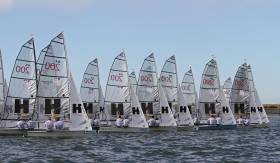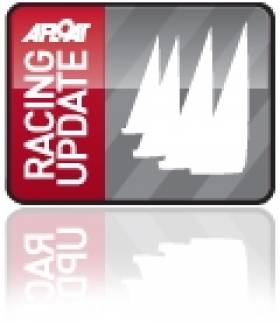Displaying items by tag: Royal Corinthian Yacht Club
Olympian Ben Saxton & Toby Lewis Retain Endeavour Championship Title
Ben Saxton and Toby Lewis (Nacra 17) once again won the Endeavour Championship after some epic sailing hosted by the Royal Corinthian Yacht Club, Burnham-on-Crouch, thus successfully defending the title they lifted in 2015 writes Sue Pelling. This win means Toby has been the winning crew a record six times now, which equals Nick Craig’s helming record.
Saxton was pleased with the racing and commented after the final race: “It was tricky again today, trying to figure out the tides and the wind. I think we did a good job in the first two races and could afford to try some different, safer options in the last two races. It wasn’t any easier though because everyone sailed really hard. Absolutely fantastic racing by everyone.”
Lewis added: “The conditions were tough and we had some serious races with competitors like Edd [Whitehead] and Karen [Oldale] representing the RS500s. The course was unpredictable and ever changing wind conditions requiring some serious concentration.”
The day started with a fresh northerly breeze of about 14 knots with some menacing clouds on the horizon. Fortunately no major rain fell and the experienced competitors were taking advantage of every gust that came their way, especially on the downwind legs where most of the boats were on the plane.
As the day wore on the winds lightened up slightly but remained northerly at about 10 knots, with the occasional big gust, making it more difficult for the heavier crews to maintain optimum speed. The race for second place quickly became a hot contest between four different teams. The RS200s team, Matt Mee and Joanna Wright, managed to sail a consistent four races to secure second place overall, seven points ahead of Nick Craig and Holly Scott (D One).
RS200 national champion Joanna Wright was happy: “Matt and I have only ever sailed together in this event so today we were getting use to each other and had a solid day’s sailing and working together as a team.”
“There are many ex-RS200 champions and RS200 sailors in this fleet and we were determined to beat them,” added Mee.
Nick Craig came third and was enthusiastic about the racing: “Today was very similar to yesterday for us. The racing was tight but we felt a little sticky, almost not as quick as we could have been. It would have been so much better if we had that 30 knots of wind but it was not to be. Hats off to the other competitors, we really had a great time and some great racing this weekend.”
The Merlin Rocket team – Roger Gilbert and James Stewart – who managed to come fourth overall, are not newcomers to this championship as they have, as a team, won the event in 2003 when they represented the RS400 class at the championship. Gilbert was quite frank and jolly about the racing: “It’s been a long time since we won, we use to be the fittest and the youngest but that appears to have changed. The conditions were very testing and possibly the wind was a bit too light for us. We are still very pleased with the results.”
Christian Birrell and Emma Norris (Fireball) came fifth overall. Birrell was excited about the conditions and the outcome: “We read the tide much better today, we were not all over the place like yesterday. Today we just stuck to what we know and sailed hard to make up places. Two firsts, a second and a third was great sailing for us today.”
Niki Birrell, Christian’s brother and bronze medal-winning Olympian at the Rio Paralympic Games, was invited to sail in the Endeavour Championship and thoroughly enjoyed the experience. When asked about sailing against his brother he replied: “Yesterday I beat him in three races, somehow today he found his mojo and just took off and left me behind. It has been absolutely fantastic and such an honour to be entered. We found the racing to be tight, hard and very competitive and we are very pleased to have come 11th overall. This event has given me much inspiration to pursue my dream of winning a national championship and I know I will need to learn to sail quicker to achieve this dream.”
The weekend was concluded with a prize giving ceremony held at the Royal Corinthian Yacht Club before the competitors packed up and went their separate ways. Edwin Buckley – event director and race officer commented during the prize giving: “It is always a pleasure to have such champions on the water competing, they give it all that they have and make this event a true test of skill, endurance and tenacity for each other. We wouldn’t have it any other way.”
Overall Results (eight races, seven to count)
1st NACRA 17 – Ben Saxton and Toby Lewis (13pts)
2nd RS200 - Matt Mee and Joanna Wright (31pts)
3rd D ONE - Nick Craig and Holly Scott (38pts)
4th Merlin Rocket - Roger Gilbert and James Stewart (38pts)
5th Fireball - Christian Birrell and Emma Norris (38pts)
6th RS AERO 7 - David Ellis and Chloe Martin (55pts)
Endeavour Signs up Topper for Further Three Years
Burnham-on-Crouch, Essex (Wednesday 6 October, 2010): Following a hugely successful 50th Endeavour Trophy champion of champions event last weekend at Burnham-on-Crouch, Topper Sailboats has agreed to renew its sponsorship deal for another three years.
Topper, who has supplied a brand-new fleet of Topper Xenon dinghies on an annual basis for the last six years, has decided to continue its association with this prestigious dinghy champion of champions regatta, to help the host club – the Royal Corinthian Yacht Club – maintain the reputation it has for running such a unique and high quality event.
Edwin Buckley – Event Director – chatting about Topper's involvement in the event, said: "We are absolutely delighted that Topper has agreed to continue its support. Thanks to Topper, we have seen the Endeavour grow into a highly acclaimed professional sporting event. We are passionate about ensuring this event continues to grow and hope we can attract more support to help it through the next 50 years. However, we do rely heavily on sponsorship and are looking for new supporting sponsors to match Topper's enthusiasm for the event."
Rick Reading – Topper's Sales and Marketing Director – added: "We are pleased to be involved with such a hi-profile dinghy event as the Endeavour Trophy and look forward to continuing to provide support. We have had a lot of valuable feedback about the Xenons from the champions who've sailed them over the years which has helped with the continued development of our Topper range of boats."
For full results of the 50th Endeavour Trophy, which took place last weekend, visit: www.royalcorinthian.co.uk/endeavour-championship
Tiger and Super Nova to Contest UK Quarter Ton Cup
Two boats are travelling from Ireland to take part in the UK's Coutts Quarter Ton Cup hosted by the Royal Corinthian Yacht Club, Cowes, from Monday 14 to Wednesday 16 June 2010. The event is expected to attract a record entry along with some exciting new members of the fleet. Boats will be based in Cowes Yacht Haven for the event, writes Fiona Brown.
Having got a first taste of the fleet aboard his father Neil's Manzanita last year, young George Kenefick will be back again sailing the Kenefick family's newly purchased ASAP know known as TIGER.
This stunning all black 1989 Fauroux design has achieved some great results on the UK circuit for the past two seasons and with the very talented George at the helm plus a crew that includes some of Corks finest young sailors including George Kingston, a Laser European champion, and Donagh Good a Laser Junior National Champion,we can certainly look forward to a good performance from this team.
Tiger has just returned from the Liebherr Cruiser Nationals in Dublin and succesfully won Class 3.
They have begun training for the event and if you look out on Cork harbour this week you will be able to see this immacuately re-stored Quarter tonner.
Also making the trip across the Irish Sea, this time from Dublin, will be Ken Lawless who purchased the immaculately restored Super Nova from Ollie Ophaus and who is looking forward to his first Quarter Ton Cup and just recently finished in third overall in the Liebherr Cruiser Nationals.
For the fifth year running the organisers are delighted to be partnering with Coutts & Co, the UK private banking arm of the Royal Bank of Scotland.
For further information, Notice of Race and Entry Form for the 2010 Coutts Quarter Ton Cup please visit: www.rcyc.co.uk
Keep up to date with Tigers progress on facebook.
































































